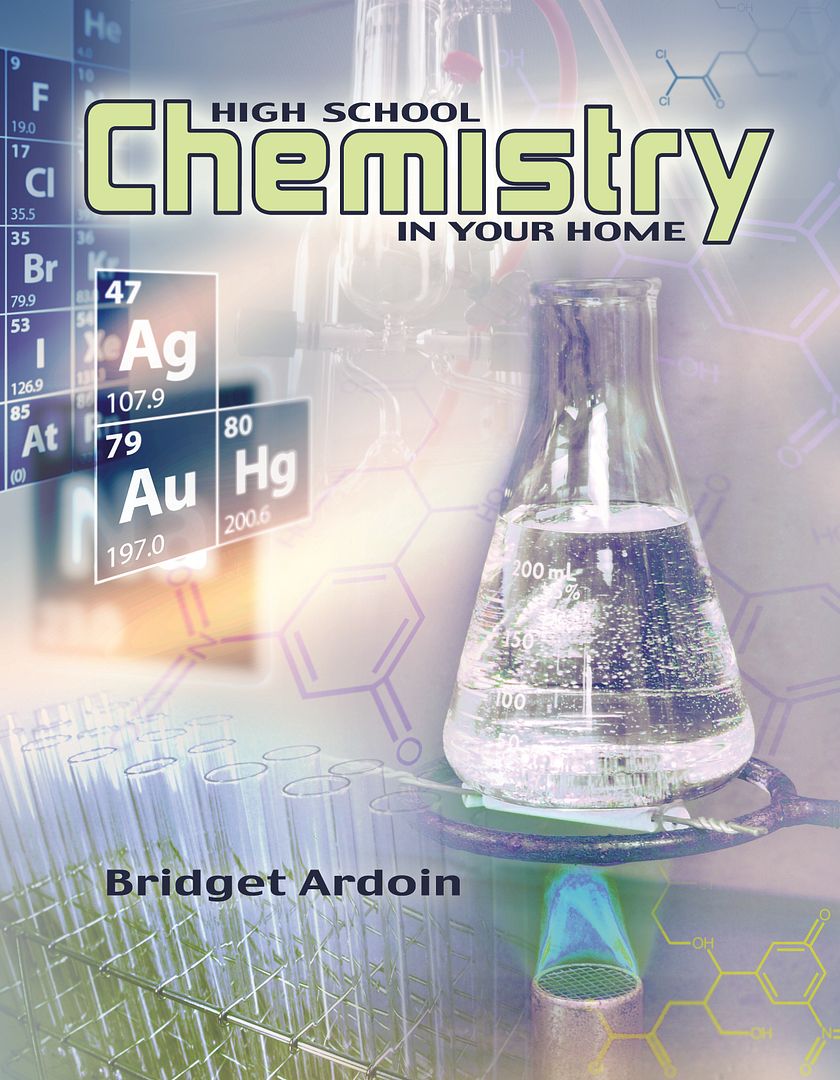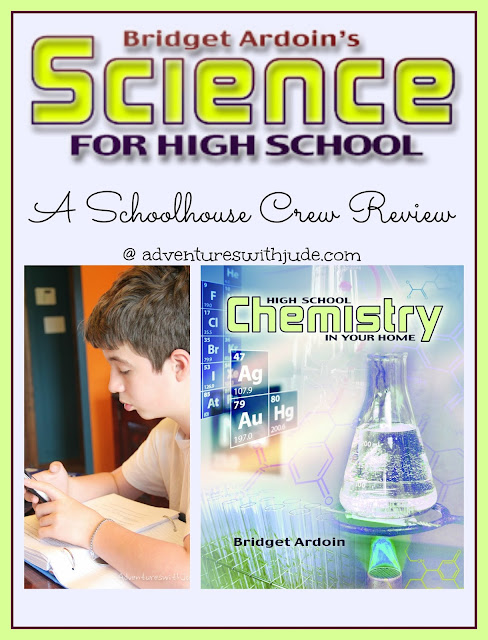Let me tell you, unexpectedly finding yourself homeschooling high school when you have no experience beyond teaching kindergarten is extremely daunting. It falls under "You do what you believe what is best for your child, and hope that as long as you're one day smarter, you'll be OK." Looking over the diploma requirements for New Jersey, I saw Luke needed three years of laboratory science. He completed biology this past year, and would have taken chemistry this fall. When it comes to chemistry, I'd like to think I'm more than just one day smarter, since I have been through both high school and two semesters of college chemistry. I felt that teaching him wouldn't be too difficult (and thankfully, Luke enjoys chemistry). The trick was going to be finding a presentation that engaged him. Looking at the website for Science for High School, I thought this might fit. The company offers three courses - Physical Science, Biology and Chemistry, all with labs, so that covered the "Will it work for credit?" angle. I hoped that the set up of the program would work. I know that if Luke were still in a regular school, he would be stuck with whatever program they used, but one of the benefits of homeschooling is being able to tailor the course to the student's learning style. We got the materials and dove in.
 High School Chemistry in Your Home
High School Chemistry in Your Home
Now, I will admit that my chemistry classes were a LONG time ago. However, as I read through the Manual Set ($79.99), I was surprised at how much I remembered. While I know I don't recall every detail of those classes, the manuals seemed to cover a good chunk of material. Many of the questions in the students are what I call "vaguely specific." They are vague enough that the student really needs to use critical thinking skills to come up with the correct answer, but specific enough that the student clearly understands the question being asked. For example, the very first two questions that start the program:
1. State the definition of chemistry.
2. What areas of life does chemistry affect?
"State the definition" is pretty obvious. However, the second one is a little harder. I let Luke make a list of areas, but then required him to tell me why he chose them. Some were pretty easy to figure out: forensics, preservatives, ammunition, and baking. Baking he was very familiar with - his fifth grade science fair project focused on the chemistry of gluten free baking and he baked five applesauce cakes to see what happened when you took the protein from wheat flour out of the equation. Medicine was another he listed; this one was easy for him again because of the science fair; in sixth grade he took 2nd place in his division for his project - The Effect of Antacids on pH. The last one he listed was evolution. I said he had to explain that one - because evolution is really considered a genetic field. His reasoning was the chemistry of the world (increased heat, cold, chemicals in water, changes in nutrient content of foods) affected creatures and they adapted in response to all of those. I'd say he's correct there, so yup, that's six.
Notice I said, "The two questions that started the program." I mean this literally. This program is NOT a read-the-text, answer-the-questions. It's a "discovery" method, not a traditional textbook. Each unit lists approximately ten questions concerning the topic, and then two pre-lab questions that help you prepare for the lab experiment. The student's task is to look up the answers to the questions. Though any source that has the answers (a textbook, a student encyclopedia, etc.) is fine to use, Luke has been getting a lot of experience with Google. (He tried using his iPhone and asking Siri, thinking she'd get him more specific answers. After her not understanding him, or giving him the wrong answers, or sending him on a wild goose chase, he gave up and just started typing keywords into the search engine bar.
The first couple of units were a struggle for him, because it's a different mindset than what he's always done. He has always had a textbook program. The tradeoff is that while he doesn't have a ton of reading, he doesn't have all the answers within a few pages. Something he's quickly learning is that just because something is the first or second hit on a search engine, it doesn't mean it's truly related or the correct answer. He's learning how to sift through this, which is definitely a good research skill. Luke found that looking up the questions CAN take a long time to do - if you find yourself wandering down rabbit trails. (If you have ADHD and are easily distracted, it may take a bit of practice to stay focused!) If you stay focused and just answer the questions, you can be done in about 45 minutes.
From Luke:
I like that don't have to take a lot of notes. The questions are targeted so I have specific questions to answer as I reads. I don't have to try to recall what I read to answer questions - I am answering as I go.
I dislike that when I look up the answers, there can be multiple answers, and I don't always know which is correct. Not having the context of a textbook sometimes makes it harder, because the question is independent of any other information to help figure out the answer.
Don't worry, parents. Your book comes with the answers! You don't have to spend hours searching the web. While sometimes Luke's answers don't match word-for-word, if it's obvious he has the correct idea, I call it good enough. Plus, as much as I love science, I switched from pre-med to theater/English for a reason - Math is NOT my strong suit. I appreciate that it teaches him mathematical concepts (so far, we've worked on significant numbers, scientific notation, SI units and density) but gives me the answer to just check and see if he has the right number of decimal places. Whew!
Also included are pre-made quizzes (and the answer keys) for each unit, along with two cumulative semester exams. They are definitely a thorough review of the material, and don't contain any surprises. Most of the exam is multiple choice, though there are a few essay-style questions. However, from what I can tell, there is nothing on the exams (or quizzes) that isn't covered in the corresponding unit(s)/lab(s).
Remember the part that NJ requires "laboratory based science course" for full credit? Well, there is also a lab manual included in the program, with a lab for each unit. The first unit starts out with doing lab experiments safely - how to measure, how to heat things, how to CAREFULLY sniff odors (by waving your hand and wafting them over to your nose, not sticking your face halfway into the test tube!), and then the rest of the labs correspond to the specific topics covered in base units. The lab guidelines are very thorough - the purpose all equipment needed for the experiment is listed, and the Procedures are very exact. If you wish to require a full lab report of your student, much of it is already outlined, including any tables and specific requirements for the Data and Observations section, but the student would need to write the "Results" and "Conclusions" sections on his own.
Note: Science for High School does offer lab kits for each program, but they are NOT included in the cost of the manual. We purchased the complete lab kit ($49.99 for just lab materials, $59.99 including test tubes/glassware/etc.), along with an alcohol burner and stand ($15.00). It may be possible to get materials elsewhere, but I just ordered these (at my own cost) for simplicity's sake. If you are purchasing the entire program, there is a discount for purchasing both at the same time. A very nice touch - the author of the series, Bridget Ardoin, personally emailed me when my materials were shipped, with a note to feel free to contact her at any time if I had questions.
Another nice thing is that because there is no textbook, there isn't a whole lot to lug around! The student book arrives in a pre-punched, 3-ring binder format. Luke has been able to write directly on the papers, or on a sheet of looseleaf that he adds within the section. The teacher's manual is spiral bound (no need to add extra room for notes, since all the answers are there!).
We really like this program, and intend to see it through for the rest of our Chemistry course. It's thorough (which I like), doesn't have a lot of superfluous reading (which Luke likes), and has great labs (which we both enjoy). I'm glad I have one less thing to be nervous about! I'm sending up a fervent prayer - "Thank you, God, for the blessing nicknamed 'Sister Chemistry' you gave me Junior Year, and hey, Sister, could you whisper in His ear and ask if I could just remember most the stuff you taught me?" Once we got going, we've done well. It was just figuring out where to start.
There are many high school scientists on the Crew! See which course they have been taking!

©2012- 2013 Adventures with Jude. All rights reserved. All text, photographs, artwork, and other content may not be reproduced or transmitted in any form without the written consent of the author. http://adventureswithjude.com






Ahh! Chemistry! Luckily I have a long way to go before I start teaching this, but it's great to know there are some great resources available!
ReplyDeleteI thought I did too, but now Jude wants to do chemistry along with Luke. He wants to "blow stuff up too!" Ay!
DeleteLooks like a great program. I loved chemistry in high school. We did an elementary chemistry program last year and I really enjoyed it as well. Such a fun subject if taught well. Glad you found a good one.
ReplyDelete